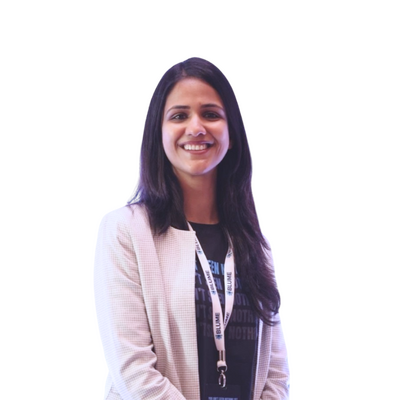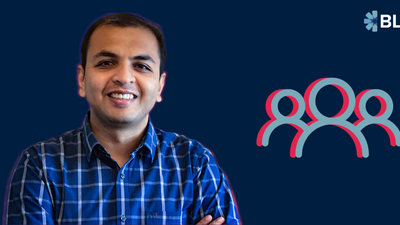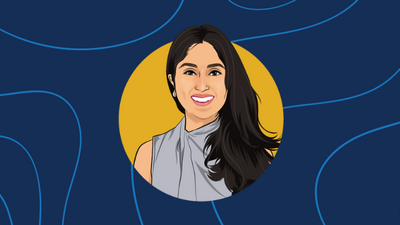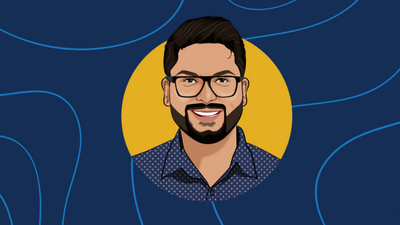I've been thinking of how best to capture the journeys of our team members at Blume and the unique roles they do, so I interviewed one of them as part of a series on how they got here, and hope to do many more like this to pull back the curtain on what really happens at a VC fund.
Today, I bring you the story and journey of Deepika Jain who leads the Community function at Blume Ventures, under the mentorship of Sarita Raichura, one of Blume's leaders. Community sits within our Platform Team, and the Platform team focuses on value-added services after the capital has been deployed to help accelerate portfolio performance. Platform has always been a broad, amorphous space in Venture Capital that tries to encapsulate anything and everything we can do for our founders and their teams. At Blume, we took a specific call a while back to go deep - and to go all in. That means bringing in people to focus specifically on certain aspects of founder support.
The Community team at Blume works on - among other things - building a peer community between founders (of the same vintage and across vintages), bringing in experts, mentors and advisors to share learnings and insights, creating intentional platforms and summits for learning & development, creating relevant content for async access and, more recently, building close relationships and partnerships with external stakeholders, enterprise businesses, policymakers and ecosystem partners.
Whew!
Community - and other Platform roles - also has the unique position of being a role that doesn't get involved in investments, deal sourcing, the exciting stuff that people think Venture Capital is. And I thought there was no better way to impress upon the importance of these and other roles in a VC firm, because a lot of the real work begins after the deal has been signed.
So today, I share excerpts from an interview with Deepika where I invited her to share her own experiences and a behind-the-scenes look at what really happens at a Community Function in Venture Capital. We cover:
- How she got to Blume
- How her definition of this role changed from when she joined
- What people don't realise about Community and platform
- What impact roles other than Investment roles can add to founders and to a VC fund
- What parts of her job have been hard, and what her successes mean to her
- Her recommendations on how to get ready for a similar role working on Community Initiatives in VC
Ria: So I wanted to spend some time talking to you, and understanding your journey, because I think it's very important both for our team and also other people to understand what it takes to be a VC professional. And I think sometimes there's a limited view of what it takes to work in venture capital, what exactly all the people do. I also of wanted to use this opportunity to showcase a lot more beyond what happens only in the investment side. I think there's so much more that we we're doing. So this is my way of chronicling the journeys of VC professionals and doing a "How did you get here" series?
So I'd love to understand for you, where did your career begin? What were some of the early decisions you made? What were some of the guiding principles that you had in choosing the kind of work you wanted to do? How did you make certain decisions including taking the role at Blume?
Deepika: I think it all started right after college, when I was placed in a big MNC where I realised very soon that that's not something I enjoy. I realised that I'm a very small person in a big team of contributors and my absence means nothing and does not affect any work. As part of my own personality, I enjoy being at the centre of things and being responsible for something and not being the person who always was a backup. So I took a short break as I tried to figure things out. I then went on to join a small startup which had less than 10 team members and I was in the role of B2B sales. Because it was a small team, that gave me a taste of multiple functions at a time.
When I was in that role, I actually attended a few startup events because I was in sales, I wanted to meet a lot more people and that opened up the entire world of the startupecosystem to me. I met so many people, I knew there was this different world that was just solving problems as they were coming. I met various ecosystem enablers at that time who added value to the startup ecosystem in different ways, whether they were from the government or from colleges. They were founders, CXOs and everything in between. So that's where it all began. In my job prior to Blume I was with Headstart, where I was one of the only employees for a very long time. That again gave me a taste of various functions and that's where I got very passionate about helping founders and working with them, doing something to make their lives easy.
Once I completed over 5 years at Headstart, where I was not working with a specific cohort or group of people, I realised that I'm ready to go work with a set of people and say, "this is my cohort, this is the group of people I want to be adding value to". So I think that's where it all started. And I'm here with Blume today for almost two plus years and working with Blume's portfolio and also ecosystem partners. But I think that just is a part of the whole community role, you end up working with - and adding value - to various people in the process.
Ria: Before we get into your role at Bume, I think one question that I wanted to ask you was where and how did you realise what your purpose is and what work means to you? I think we talk a lot about work-life balance and really bringing these things together. Were there any moments where you realised that, okay, this is what gives me a sense of satisfaction and this is what impact means to me? I think a lot of it did come around maybe your exposure to Headstart, but maybe before that, what did work mean to you before your exposure to Headstart? What did it mean to you afterwards? And I think today, what does it sort of mean to you to do meaningful work?
Deepika: I think it's just the feeling of doing something right and adding value to someone's journey. Small actions that I do, whether it's simple learning and development for the founders today, or it is making a quick introduction for mentorship, discounts, deals, anything to make their lives easy. It's that feeling that you've been able to add value to someone's life and someone's journey - that was the highlight. And that's when I realised this is what I want to do. Also, I have often noticed that there are small incidents that happen in founders' early journeys that go a long way with them. It could be a small demo during one of the startup events that may give them access to multiple customers, or an intro to that investor who will stick with them throughout their journey.
Ria: What did you think this role was when you were interviewing for it before you joined and how has or hasn't that definition changed for you, two years in?
Deepika: When I joined Blume, I was prepared for this to be all about learning and development and creating programs for the community.I thought it was just going to be about the founders, but as I spent some time here, it occurred to me that okay, we are going to be adding value to founders and their CXOs too, because that is an important part of the L&D function as well. I think what changed after about a year is when I also started working on relationships in the ecosystem for our founders just to make their lives easier. Whether it was connecting with corporates to open up some business development opportunities or with some companies to just get them some deals, discounts or whether it was for troubleshooting or getting them special privileges because they're a part of the Blume family. I think that was something that I did not think would be a part of my role but has come to be now and I thoroughly enjoy it - again, because I feel like these are small things that really add value to the founders. It makes a big difference in their lives.
Ria: How has the reception from the Blume team changed for you from when you joined to what you're doing today? How do you feel the team has viewed your involvement and your input, both sort of working with founders, being part of the internal team, figuring out what we should do? How do you think that has changed?
Deepika: I think earlier it was about Deepika doing a lot of events for the portfolio. They thought I’ll be working on just the learning and development for our founders, which honestly wasn't too exciting from the outside and didn't look like a big deal, right? Because there's a lot of L&D outside also. I think it changed eventually when all of a sudden someone says, "hey, we need a connect at Meta because my portfolio's Instagram account was hacked last night. Is there something you can do urgently?" So from just working on L&D to now being one of the few people who holds a lot of important relationships and relevant relationships for the portfolio. I think that's changed both for me and the team for sure.
Ria: How do you feel your definition of community has changed in terms of what your inputs are and what the outcomes are? I think we use this word or in venture capital we say we're building a community, we're doing all of that. How do you think you are doing something different here than what other VCs may also be doing?
Deepika: We've always believed that platform starts as soon as the capital is deployed. We've always focused on going beyond capital and adding value - and sometimes it's not always clear what that means. I think we are very proud of the connections we make and the opportunities we unlock, versus other firms who may be a little conscious about their engagement in the ecosystem. What we've also done differently at Blume, is we've hired multiple roles and team members at Blume just to take care of specific roles like Market Networks (for business development), we have MetaMorph (our talent partner), we have Constellation Blu (our financial and legal advisory), Capital Markets and of course, Community. Yes, it's more work for us, but we try to go out of the way to check with our founders, and our portfolio on what support do they need. And then we go out of our way to make those relationships.
Ria: Let's talk about outcomes and metrics for a minute. A lot of community is built on relationships and sometimes that can also steer into a very grey area where a lot of your work is based on relationships. The question might come on, how do you evaluate yourself? How do you measure success? So I'd love to know how does Blume community as a function consider success and how do you personally consider it, right? Because I think it's super important to have something that's motivating you every day driven by you and not external functions. And for you to feel like, Hey, I've done something. This is worth it. Especially in such a grey area where it's not just quantifiable goals that, oh, I spoke to X people. The outcome of a lot of these relationships happens over a long period of time. So I would love for you to talk a little bit first about how Blume as a function thinks about this, and then how does your personal philosophy also play into it and how do you stay motivated here?
Deepika: All of this happens over time. We do the smaller things like tracking attendance, and feedback. We are course-correcting where required, we are checking with the community constantly on what they need and setting that up, whether it's relationships, whether they want us to open some doors or whether they just want us to organise some sessions for them. I think what metrics we notice internally is how fast we can solve someone's query now because we've built a database of knowledge and contacts. I've started to notice a faster turnaround of response on our WhatsApp communities (smaller communities of founders, product heads, tech heads, etc.)when someone's looking for a connection or looking for some sort of relationship in the startup ecosystem., Also, a lot of credit goes to the BlumeBook, which is our internal knowledge repository where we host a lot of this data and content. So when we get a request for vendors or agencies, we can now directly share a link to some names, and lists. Further, we are able to also say “Here is the vendor list along with comments from Blume portfolio companies who have left their experiences here, for added context. And thirdly, we're able to say, "Hey, I can also make some introductions for you if required." And lastly, we can also offer them discounts for certain services just because they're a Blume Portfolio company. So I think each value add is an evolution, a step ahead of what we used to do.
Ria: What are your personal metrics of success? How do you keep yourself motivated in an ambiguous environment like this where a lot of it has to do with people with long-term relationships?
Deepika: I have seen myself grow from coming to a Blume and having a new cohort and not knowing anyone here, to now knowing the founders and their CXOs. Today I'm in a position where the founders and CXOs are able to message me personally and say, “Deepika, I need this support. Can you help me with it?” So now the portfolio is aware. The portfolio companies are all aware that, okay, Deepika is our go-to person. I think that is how I measure myself. If I am looked as the problem solver for my portfolio, I feel like I'm doing it right. Of course, there's always the need to improve on what you're doing. But I have seen myself grow from when I started two-plus years ago. I used to introduce myself in every message and email to founders and tell them about my role. Today I can call a founder and recommend that they join a particular learning session. Those are some of the things that make me feel like, okay, I have evolved and grown from where I was two years ago and this is just going to get better from here on.
Ria: Thanks for the insights. I want to switch gears a little bit and get your thoughts for people who are considering Venture capital as an industry, as a career and the predominant notion tends to be - to work in venture, you're an analyst, you're working on the investment side. What would you say to folks who are considering a career in venture who may not know how to leverage a different set of skills or what's there on the other side of the table? And we're very fortunate to have built our brand and get a ton of inbounds for investment roles. But investment roles are few and far between. So what have you learned working on the non-investment side and how would you share your learning so that someone considers this as a very viable career choice? What can they get out of it? What are they adding value to and how would that play a part in someone's career journey?
Deepika: When people generally talk about a VC fund, it's all investments, investments and capital. But working in the Platform is very different from that, and it's great for people who thrive on relationships. I would love people to really realise that Platform roles do not have a template because each relationship is unique. It's so relationship heavy, it's so personalized for each person. There are so many stakeholders you work with to extract value. Sometimes you're working with corporates, sometimes you're working with different portfolios, different founders of non-portfolio companies, and sometimes just working with experts around in the startup ecosystem. There are different styles to work with each group of people.
Ria: I was just going to interject here and ask, I completely agree that there's no template, but have you felt like there is a certain sort of DNA or certain profile that someone working in Platform tends to have? And it might happen unconsciously, the folks that we've got in our team or the other platform folks that you may have met, and I'm sure you've seen some commonalities in that sort of DNA. And what have you seen over there that a platform person tends to have in their beliefs, in their approach, in their values?
Deepika: Yes. I think it's the biggest value is to be a people's person and to believe that every relationship is important. It's a very relationship-heavy role. You never know which person might be able to add value to your portfolio company five years from now on. So I think the kind of DNA that people like me tend to have in these roles, is to just be slightly extroverted, be able to manage that many relationships and keep them close, and not burn any bridges no matter what. Always constantly keep your portfolio at the back of your mind to see where you can connect the dots. The second thing is to be able to identify who can add value to your portfolio in what way, if not today, then when some other time in the future. So you keep them at the back of your mind and you have the names ready when your portfolio says, "Hey, I'm expanding to the North American market. Can you connect me to someone for mentorship?" You can then say, "Yes, I met someone a few years ago, let me make that introduction to you.". The most important thing about being a community person, a community leader, is to be there 24x7. When there's a fire, founders will come to you and say, "There's a fire in the house, I need to process this payment today, but I have a problem with my billing. Can you connect me right now?" So, one thing we do beautifully at Blume is to keep our eyes and ears open - whether it's via our team members, our investment leads, or just our WhatsApp groups, we are just constantly alert - when someone calls out saying, "Hey guys, I'm stuck with this. Do you have any hacks on how to go about it?" You're alert and you say, "Hey, I can help you with this."
Ria : So you brought up the point of being available 24 7, which I think is a hundred percent a mindset than sort of an expectation. And I think that is a big thing that we tend to look for generally at Blume right? I think we've tried hard to make sure that people feel supported and that they have their time, but that they expect the core DNA of the role to be there for founders. I'd love to hear from you about what other parts of your job are hard. I know it's not been a bed of roses. I know there've been ups and downs taking a lot of feedback. Community, I would say is a very democratic and open function. It serves the founders, but it also serves a lot of our investment leads, and trying to do something that fits everyone doesn't always work out. I know you've experimented with a lot of things, but I'd love to hear from you in the spirit of honesty and transparency, what parts of your job are hard? What parts of your job have made you question sometimes? Are you the best person for it? And how have you gotten through it? What examples or what data points have you looked at to really reassure yourself that I can do this and it's a dip in the road, but it doesn't stop my journey?
Deepika: A couple of things come to mind. One is, as I call it earlier also, it's a 24x7 job. When founders need something, they need it now. And then to be able to connect them with the right person at the right time and not go via hierarchy or multiple people to solve your problem urgently - I think that gets a little tricky sometimes. And sometimes, as we've learnt, when you give your founder an inch, they’ll take a mile :) It normally goes like, "Hey, I can open this door for you." "Okay, but I also want these five other things!"
That gets a little difficult sometimes because you have to balance this relationship. So when I'm working with a partner, if I am getting something for my portfolio from them, it is a transaction that needs to be completed by returning the favour in some way. Sometimes it becomes a little difficult to manage that because you also want to do everything in favor of your portfolio. But at the same time, if it's not balanced, well then that can burn a bridge, and the relationship can get affected. Sometimes it's difficult to always match expectations to return favours for our enterprise partners. It is a transaction, no matter what you say, there is no free lunch, and there's no charity ever. We have a lot of founders who are willing to share their knowledge with the younger folks. You call that pay-it-forward. You can do that in an internal community. But when you're looking at corporate partnerships, they're never pay-it-forward. There's no charity. Everyone's here for a transaction. So that is a little difficult. I think just broadly that maintaining these relationships can be a little tricky at times, but it's almost always worth it.
Ria: What have been one or two highlights for you during your time over here?
A fantastic session, fantastic feedback, or some connection that you engineered that you were super proud of.
Deepika: Our relationship that we've established with complex orgs like Apple has been a big win recently. I recently learned that they have an app accelerator in Bangalore where founders can go sit, work, and get experts to guide them and help take their app to the next level. We also recently organized an EV Summit with Google where various ecosystem enablers like Ashok Leyland, Ather, Bajaj as well as policymakers, government, corporate people were present. Also recently, the global head of Google Maps wanted to meet with Blume and learn more about the Indian ecosystem. These are all byproducts of the relationships that we have established and maintained over the last few years.
And all of this honestly started with very small things like, "Hey, can you connect me to A, B and C startups so we can talk to them about our offerings"? Now Google asks us if they can spend time with our portfolio company to understand what are their challenges across various Google products and deploy a relationship manager for that company and take them to greater heights. So I think that the evolution of that relationship is a big recent example.
On the L&D side, we also recently held our first-ever offline edition of Velocity (our cohort-based program for early-stage portfolio companies). The feedback was quite positive, and I see that the cohort has now become like a college batch of students - most of them will go on to maintain this relationship and help each other throughout their startup journeys.
Ria: I just had one last question, I'd love to know what advice you'd give someone who's interested in doing a similar role like yours working at community, at an early-stage venture capital fund. What's one or two pieces of advice you'd give them as they're considering this or starting out in a similar role?
Deepika: I think it's very fulfilling. This job, this role is very fulfilling because, at the end of the day, you are left with a feeling of, "Hey, I was able to help this particular company in a small way or a big way." There are different days of seeing different outcomes, I think. But one piece of advice is that there is no template. I shared this earlier also, there's no playbook on how to do something, and you shouldn’t even expect one. Don't expect a set of guidelines. If you are able to maintain the right relationships and keep continuously networking with people and keep all relationships close, I think you'll do well and you'll be able to add value to everyone around you as a part of your role. But yes, there are many mentors out there. I have spent some time following and chatting with people like Avinash Raghava, who has built a lot of great communities at SaaSBoomi and Accel, I have learned a lot of new things from him. The biggest takeaway I had was how to manage a large community and maintain relationships. And knowing every relationship is important and you never know when you're going to be leveraging them is something I learned from him too.
Ria: Thanks Deepika for going deeper into your journey. It was a pleasure listening to you and hearing your journey and how Community fits into venture capital.
Deepika: Yes, thank you so much. It gave me a good chance to reflect back on what my journey's been like so far. And it's actually been beautiful. I'm very convinced that this is an excellent role to be in, especially in VC because this is way beyond capital. Your work starts when the capital is deployed, you start adding value to people and it's very fulfilling. You ask yourself, do you feel happy about every small transaction that you do here?
Ria : Thank you. I hope this helped demystify VC a little bit for people reading this. I think anything we can do to get more committed people into the VC ecosystem on both sides of the table, ultimately it's a win for us. It's a win for our founders. So hopefully this inspires more people to look at similar roles and hopefully reach out to you for advice for mentorship like you reached out to other folks before you and being one of the leaders in the ecosystem now.








